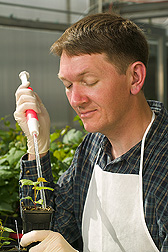This page has been archived and is being provided for reference purposes only. The page is no longer being updated, and therefore, links on the page may be invalid.
Read the magazine story to find out more. |
|
A Second Nematode-Foiling Gene Found in Grape Plants
By Luis PonsApril 17, 2006
Agricultural Research Service (ARS) studies on grape genetics have uncovered a second gene that helps grape plants resist root-knot nematodes (Meloidogyne).
The finding came during research led by ARS plant geneticist Peter Cousins on the gene known as N that naturally protects the grape plants against the nematodes. Cousins works at ARS' recently established Grape Genetics Research Unit (GGRU) in Geneva, N.Y
Specifically, Cousins and colleagues studied a type of grape—an accession of Vitis mustangensis called DVIT1842—that fends off a new strain of root-knot nematode that is able to overcome the natural defenses of other grape rootstocks. These aggressive nematodes are putting an economic strain on many grape growers, particularly in California.
Laurie Boyden, a Cornell University doctoral student working with Cousins, made the discovery that the source of DVIT1842's resistance to nematodes wasn't just a variation of the N gene, but was a different gene altogether.
According to Boyden, this finding may make it possible to breed both of the nematode-resisting genes into the same rootstock, a strategy that could provide better protection for grapes if the two genes act in different ways or if their interaction makes them more effective.
The nematode-resistance study is one of many ongoing projects at GGRU, whose scientists work to improve grapes through characterization and deployment of genes. Other topics under investigation there include grape color, fungal diseases and the genes involved in ripening, flowering, bud break and leaf fall.
The goal of the nematode work is development and introduction of rootstocks that are both resistant to the tougher nematodes and adaptable to California viticulture, according to Cousins.
The work by Cousins and his colleagues began when Geneva grape genetics research was conducted in the Plant Genetic Resources Unit.
Read more about this research in the April 2006 issue of Agricultural Research magazine.
ARS is the U.S. Department of Agriculture's chief scientific research agency.


